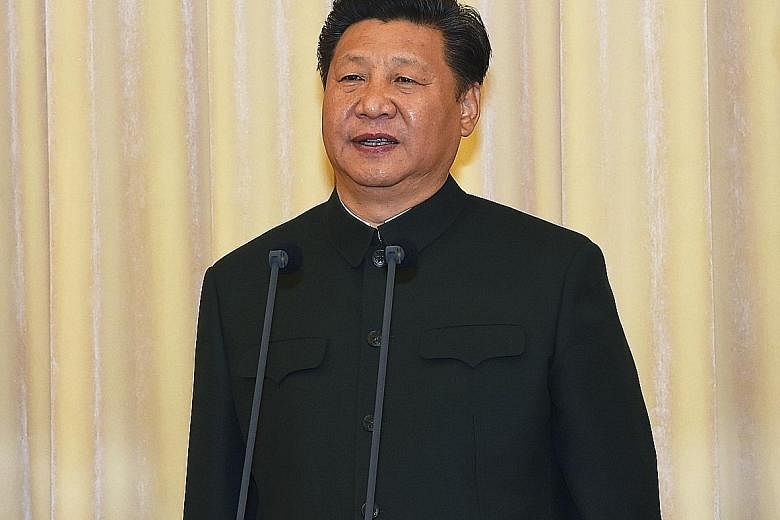BEIJING • A push to designate Mr Xi Jinping as the "core" of China's Communist Party suggests efforts to strengthen the President's hand in a year of political manoeuvring for top party posts.
At least seven provincial-level party bosses have recently publicly proclaimed Mr Xi as the party's core and pledged to uphold his leadership. The description, which would give Mr Xi a status shared by prior leaders Mao Zedong and Deng Xiaoping, was not formally bestowed on his predecessor, Mr Hu Jintao.
The semantic change could signal a shift in China's elite politics, which has for more than three decades stressed collective leadership to avoid the Mao-style personality cult blamed for fuelling the social chaos of the Cultural Revolution.
Adopting it - something that analysts said could happen as soon as next month's National People's Congress (NPC) - could free Mr Xi's hand to shape the party's leadership during a twice-a-decade reshuffle next year.
"If all this is really pointing to the declaration of Xi as the 'core' leader, then it suggests there might be some big changes at the 19th party congress," said political science don Joseph Fewsmith at Boston University, author of The Logic And Limits Of Political Reform In China.
Designating Mr Xi as essential to the party would cap his more than three years in power during which he has taken a leading role in economic planning and embarked on a massive campaign against graft that took down the country's former security chief.
While the practical applications are hard to gauge, it could potentially make it harder for anyone to question his personnel choices, and signal a willingness to break with the established practices for promoting top officials that have governed China's recent power transitions.
While Mr Xi has routinely emphasised his authority since becoming party general secretary in November 2012, the term "core" has only recently been applied, according to an analysis by Ms Wendy Zhou, a research assistant with the University of Hong Kong's Journalism and Media Studies Centre.
Hubei provincial chief Li Hong- zhong used it to describe Mr Xi during a Jan 15 session to discuss the latest guidance from the top leader, according to remarks reported by the official Hubei Daily.
At least six other provincial-level leaders have been quoted in state media using similar terminology.
The word has now surfaced in Mr Xi's remarks: He told a meeting of the party's 25-member Politburo last Friday that developing an awareness of the "core" was among the leadership's focus areas, said the official Xinhua news agency.
"You've seen two forces at work: the provincial leaders are making a good guess on the top's intention and the local propaganda machine is creating the momentum," said media studies professor Qiao Mu at Beijing Foreign Studies University, adding that "the centre dropped ample hints".
A formal pronouncement - at the NPC or a Politburo meeting - could firm up Mr Xi's status ahead of next year's gathering, when as many as five of the seven members of the Politburo's supreme Standing Committee could be replaced.
Such changes to the party's rigid lexicon are unusual. Mao was often referred to as the party's "head" or "great helmsman". The "core" concept appears to have been introduced by Deng to anoint then-little-known Jiang Zemin as his successor in the aftermath of the 1989 Tiananmen crackdown.
The push to give Mr Xi a "core" designation is potentially "a sign of internal opposition and party infighting because a mid-term power transition is around the corner and he felt the need to emphasise something he appears to already have", said historian Zhang Lifan. "In Chinese politics, what you seek can show what you lack."
BLOOMBERG


